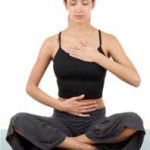Deep Breathing!
Practice mindful deep breathing regularly during your day to decrease physical and mental stress. Inhale for a count of 3-4 seconds. Hold for 1 second. Exhale for a count of 4-6 seconds. Slowly extend the duration of your exhale. Repeat for 2-3 breaths. Make breathing-breaks a priority during your day and you’ll feel better, think more clearly and have more energy!
 Subscribe
Subscribe




